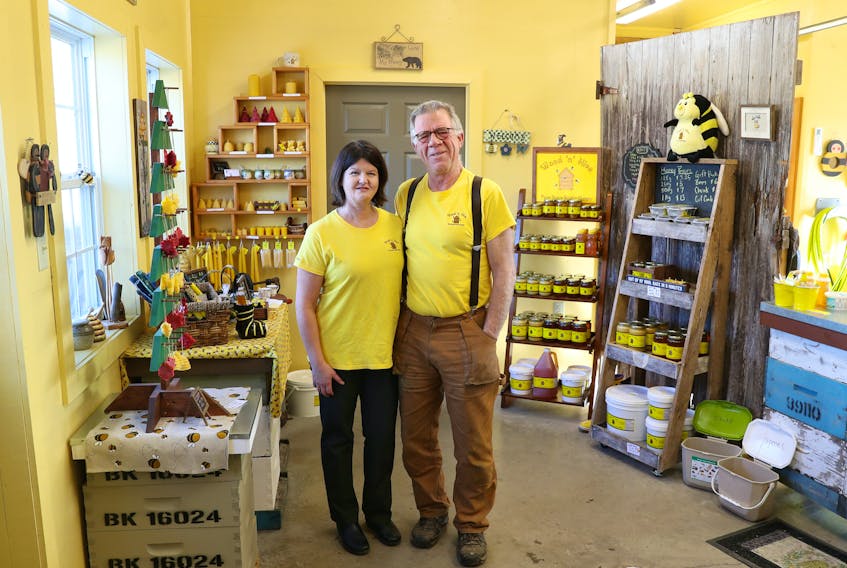TRURO, N.S. — How time changes things.
In 2003, the Crouse family woodlot in Stewiacke was devastated by hurricane Juan. For Alex Crouse, a Dalhousie Agricultural College alumnus, the silver lining was the wild blueberries that began to grow in place of the trees. Pollination was critical to cultivating the wild blueberries so Alex and his brother Matthew, also Dal AC alumnus, invested in 12 honeybee hives.
For Alex and his wife, Heather, that’s where it all began.
For nearly 10 years, Alex and his brother sold honey in very limited quantities, using honey produced by the bees that pollinated their wild blueberry fields. Recently retired from his lifelong career in agricultural sales and marketing, Alex decided to turn this hobby and passion into something more.
“Beekeeping and honey production have always been of interest to me,” Alex said. “Both my grandfather and father were beekeepers years ago.”
Alex’s first step was to enroll in the Modern Bee Keeping course through Dalhousie University Faculty of Agriculture’s Extended Learning department. Then, in 2016, Alex and Heather started Wood ‘n’ Hive with just 15 bee colonies. Together, the couple nurtured Wood ‘n’ Hive to the thriving honey bee farm that it has become in a short time.
Located in Port Williams, the business is now home to 240 bee hives. For the first time in 2018, Wood ‘n’ Hive saw the first sales of nuclear colonies being sold to other beekeepers in the Maritimes. In addition to the honey the 9.6 million bees produce, Wood ‘n’ Hive also has a wide variety of honey products such as lip balms, candles, food wraps and lotion bars. They are hand-made by Heather and sold through a retail store, selected farm markets and craft fairs.
The business’s educational component is what makes it so unique. As a part-time school teacher, the educational piece is a natural fit for Heather.
“Our ultimate goal is education,” says Alex.
Their retail shop is home to an observation hive as well as the extraction equipment. During harvest, customers can visit the bees and see first-hand how honey is handled, from comb to consumer. Wood ‘n’ Hive also offers two types of tours to consumers. Walk-through tours of the extraction, production and retail site are great tours for larger groups. Smaller groups can book a “Into the Bee Yard” tour, which involves suiting up and venturing out to the hives.
As a beekeeper, Alex maintains the bee colonies in a series of manmade boxes called supers and brood chambers with typically nine or 10 frames hanging inside. Honeybees collect nectar and store the processed nectar, the honey, in beeswax honeycombs which they build on the frames within the super. The brood chambers are where queen lays her eggs and are tended to by the young worker bees.
“Each hive needs approximately 70 pounds of honey to get through the winter,” Alex explains. “The surplus that the bees produce is what we harvest. Our goal is to harvest 100 lbs per hive.”
Another priority is the health of the bees. Alex is currently working with agricultural campus alumni Dr. Robyn McCallum and Sawyer Olmstead, of the Atlantic Tech Transfer Team for Apiculture, conducting honey bee research. Together, they tracked two Nosema species throughout the year, and investigated techniques to effectively manage this disease.
Alex also works with Dr. Nancy McLean of the Department of Plant, Food, and Environmental Sciences at the Agricultural Campus to better understand from which plant species the bees collect their pollen.
Alex also sits on the board of directors of the Nova Scotia Bee Keepers Association as vice- president and secretary.
“I think it’s important to give back,” Alex says.
As a beekeeper, the work is hard and the days are long but Alex wouldn’t have it any other way.
“I am so passionate about what we are doing,” Alex exclaims. “It’s certainly not for everyone- it’s hot, sticky work and it’s physical and repetitive. But there’s something therapeutic and peaceful about working with the hives and being in the fields. The bees do their thing and I do mine.”









